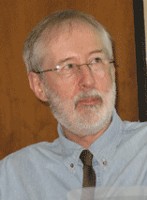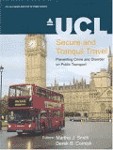
After working at the Home Office Research Unit for some years, where he carried out a review of gambling, and (with Ron Clarke) ran a controlled trial to evaluate residential treatment for deliquents. Derek Cornish joined the Department of Social Science and Administration at the London School of Economics to teach psychology, criminology and research methods. During his time there he pursued an interest (again with Clarke) in rational choice perspectives on offending (cf. The Reasoning Criminal, Springer-Verlag, 1986, and various papers). He took early retirement from L.S.E. in 2002, but remains a member of its Manheim Group. He now lives in the United States, and is currently Visiting Professor at Wichita State University's School of Community Affairs, where he is continuing to develop earlier work on 'crime scripts' and their application to situational crime prevention. Dr Martha Smith and he recently edited Theory for Practice in Situational Crime Prevention (Criminal Justice Press, 2003). They have just completed editing Safe and Tranquil Travel: Preventing Crime and Disorder on Public Transport (forthcoming).
(Photo Source : UCL Jill Dando Institute of Crime Science)
Smith, M. J. and D.B. Cornish (eds) (2006), Secure And Tranquil Travel: Preventing Crime And Disorder on Public Transport, Londres : Willan Publishing. www
 Herein lie the answers to crime and disorder. So many people become dispirited, fatalistic or angry about crime instead of seeing crime problems, like business setbacks, as challenges or even opportunities.
Herein lie the answers to crime and disorder. So many people become dispirited, fatalistic or angry about crime instead of seeing crime problems, like business setbacks, as challenges or even opportunities.
This book sets out a clear, systematic and demonstrably successful strategy for reducing the temptations and opportunities for crime. You cannot change the travelling public or the communities which public transport serves, but you can change the immediate circumstances and surroundings that you present to people, you can re-think and reinvigorate your service offering, you can recruit help from other agencies, from staff and even those who ride the system, and you can make the transition from being reactive to being ahead of the game.
The theory is backed up by concrete examples of how and why and where smart-thinking has worked before to outflank crime - this is not just off-the-shelf self-help philosophy but a compendium of real-world best practice. What's more, you can often make money, or at least save a lot of money, by doing the right thing, and this book tells you how.
Attention - Votre version d'Internet Explorer est vieille de 20 ans et peut ne pas vous offrir une expérience optimale sur le site du CICC. Veuillez mettre à jour votre ordinateur pour une expérience optimale. Nous vous recommandons Firefox ou Chrome, ou encore ChromeFrame si vous êtes dans un environnement corporatif ou académique dans lequel vous ne pouvez pas mettre à jour Internet Explorer.